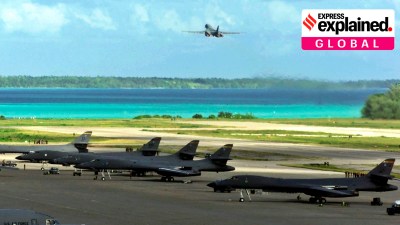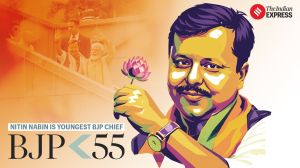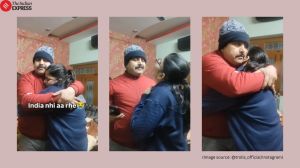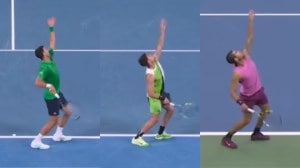In different orbits
The NDA8217;s prime ministerial candidate, L.K. Advani, has, in a television interview, expressed confidence that elections are likely to be held in 2009, and not this year.

The NDA8217;s prime ministerial candidate, L.K. Advani, has, in a television interview, expressed confidence that elections are likely to be held in 2009, and not this year.
He also took the unusual step of visiting Congress President Sonia Gandhi and Prime Minister Manmohan Singh on the occasion of Holi to convey his greetings and present copies of his autobiography to them. Earlier, he had been bemoaning the absence of personal communication
with Gandhi and its adverse impact on his relationship with the prime minister. In his 8216;Walk the Talk8217; interaction IE, March 24, he also signalled that it was possible for his party to consider the acceptability of the 123 Agreement with the United States if the Indian Atomic Energy Act were to be amended to shield this country from the provisions of the Hyde Act. In the interviews, in the wake of the release of his autobiography, Advani has projected himself as a strategist who persuaded Prime Minister Vajpayee to invite
Pervez Musharraf for the Agra summit and as a strong leader, who did not hesitate to condemn US ambiguity on Pakistani terrorism during the hijack of IC-814 to Kandahar.
Purely on objective considerations, the NDA8217;s interest lies in having the elections in 2009 and avoiding the polls in 2008. So is it for the Left parties too. Next year, in spite of all
the efforts by the US Federal Reserve, the US Congress and the European central banks, the world economy is likely to be in a worse condition than it is in this year. The central banks and governments can only limit the damage, not totally avoid it. Despite all the brave talk in India, this country cannot scape the global trend. The Indian economy is bound to be in a less favourable situation than it is in now.
In such circumstances, the incumbency factor will favour the opposition and adversely affect the ruling party in an election. The loan waiver for farmers, tax reduction for the middle classes and pay commission recommended hikes in salaries for government servants will all be distant memories 8212; evelopments taken for granted by the voters. The fall in rowth rates and possible inflation continuing into the next year are issues that will agitate the electorate.
Therefore, it is in the interest of the NDA to allow this government to last its full term. Advani has also signalled that under certain conditions 8212; which are redundant for a self-confident sovereign nation but still easily accomplishable 8212; the 123 Agreement may not be opposed.
There is also perhaps a hint that, given their interest in having the elections preferably in 2009, the NDA may not vote out the government but will let it carry on as a minority government, as it did in the early period of Narasimha
Rao8217;s tenure. If this were to happen, what could be the Left8217;s strategy?
Perhaps to have the 123 Agreement finalised by the government, with no opposition from the NDA, and the UPA continuing as a minority government till the end of 2008.
Nandigram would become a memory and so would the largesse to farmers, the middle classes and government servants. The Left could still boast of having opposed American imperialism and may still hope to get one of the nuclear power plants for West Bengal after the completion of the 123 Agreement.
What are the interests of the UPA? Elections in 2009 will in all probability be less favourable.
While Manmohan Singh and his economist colleagues may appreciate this risk analysis does the 8216;aam8217; parliamentarian go along with them? Most parliamentarians are familiar with the established probability that half of them may not get re-elected. They relate their success or failure to local factors such as the caste and communal arithmetic as formulated on the ground and not to issues such as global recession and its impact on India, world food grain prices, the oil price, and so on.
Consequently, they would tend to be in favour of being MPs till the last possible date rather than take risks on the basis of long-term calculations that go beyond the familiar local factors. Therefore, this becomes a leadership test for the UPA.
It is not in the interest of the Left or the NDA to allow the UPA to enact any measures that would enhance its popularity in the last year of this Lok Sabha. Thus, it is futile for the UPA leadership to expect that they will be able to achieve more than what they have done with the present budget. The UPA will also have to take into account the international economic situation in the coming months and its constraints on the Indian economy. Advani has clearly indicated that the core issue for the next election will be rising prices, and not the nuclear deal. That seems to indicate that the NDA8217;s calculations are based on the economic situation worsening from now on. The NDA leadership is aware that the NRI community in the US attaches a lot of importance to the Indo-US nuclear deal and it is not in the interest of the NDA 8212; financially and otherwise 8212; to alienate the NRI or for that matter major Indian business houses on this issue.
Whatever may be the UPA8217;s calculations on when to call parliamentary elections 8212; with regard to the link between the Indo-US nuclear deal and the withdrawal of Left support to the UPA that would result in elections 8212; its leadership must be clearly aware that, in this game of poker, it is in a position to call the Left8217;s bluff.
Neither the Left nor the NDA can afford to bring the government down at this stage and have an election which will not benefit them. Advani, by paying his visit to Gandhi and Singh, has perhaps deliberately heightened the uncertainties for the Left. Gandhi has shown herself to be adept in the game of realpolitik.
Though the Congress pulled down the United Front government on the issue of the DMK8217;s participation in the aftermath of the Jain Commission8217;s report, today, she hails Karunanidhi as a pillar of the UPA. Advani advocates the thesis that better communication between the two national parties will benefit both and reduce their respective vulnerabilities before smaller parties, without such communication coming in the way of their competition with each other.
All these factors taken together constitute a challenge to the UPA leadership.
The writer is a senior defence analyst ambimanigmail.com
- 01
- 02
- 03
- 04
- 05









![Kokrajhar [Assam], Jan 20 (ANI): Police deployed during a protest between two groups at National Highway, in Kokrajhar on Tuesday. (ANI Video Grab)](https://images.indianexpress.com/2026/01/kokrajhar.jpg?w=300)





















